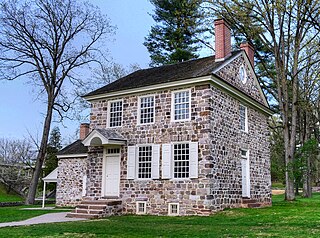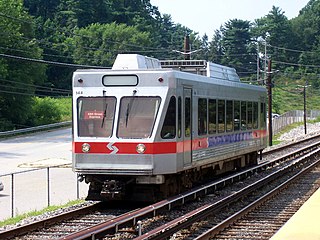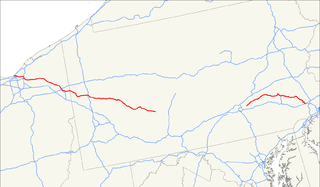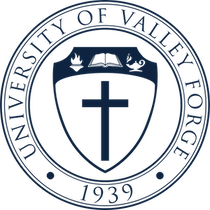
King of Prussia is a census-designated place in Upper Merion Township, Montgomery County, Pennsylvania, United States. As of the 2010 census, its population was 19,936. The community took its name in the 18th century from a local tavern named the King of Prussia Inn, which was named after King Frederick the Great of Prussia. Like the rest of Montgomery County, King of Prussia continues to experience rapid development. The largest shopping mall in the United States, King of Prussia, is located here. Also located here is the headquarters of the Nuclear Regulatory Commission Region I. King of Prussia is considered to be an edge city of Philadelphia, consisting of large amounts of retail and office space situated at the convergence of four highways.

Upper Merion Township is a township in Montgomery County, Pennsylvania, United States. The population was 28,395 at the 2010 U.S. Census. Located 16 miles (26 km) from Philadelphia, it consists of the villages of Gulph Mills, King of Prussia, Swedeland, Swedesburg, and part of Wayne.

The Village of Valley Forge is an unincorporated settlement located on the west side of Valley Forge National Historical Park at the confluence of Valley Creek and the Schuylkill River in Pennsylvania, United States. The remaining village is in Schuylkill Township of Chester County, but once spanned Valley Creek into Montgomery County. The name Valley Forge is often used to refer to anywhere in the general vicinity of the park, and many places actually in King of Prussia, Trooper, Oaks, and other nearby communities will use the name, leading to some ambiguity on the actual location of the modern village.

King of Prussia is the largest shopping mall in the United States in terms of gross leasable area, with a GLA of 2,651,631 square feet (246,344.6 m2). It is a mall with numerous retailers, anchored by Lord & Taylor, Dick's Sporting Goods, Primark, Neiman Marcus, Nordstrom, Macy's and Bloomingdale's with one vacant anchor last occupied by JCPenney.

The Norristown High Speed Line (NHSL) is a 13.4 miles (21.6 km) interurban rapid transit line operated by SEPTA, running between the 69th Street Transportation Center in Upper Darby and the Norristown Transportation Center in Norristown, Pennsylvania, United States. The rail line runs entirely on its own right-of-way, inherited from the original Philadelphia and Western Railroad line. In Fiscal Year 2013, the Norristown High Speed Line carried 2,419,500 passengers; this was down from the 2,764,000 passengers carried in Fiscal Year 2012, partly due to a two-day service suspension due to Hurricane Sandy. In Fiscal Year 2015, the Norristown High Speed Line carried 3,429,300 passengers, an increase of 9% from FY 2014 when it carried 3,147,209 passengers.
The Schuylkill Expressway, locally known as "the Schuylkill", is a two to eight lane freeway through southwestern Montgomery County and the city of Philadelphia, and the easternmost segment of Interstate 76 in the U.S. state of Pennsylvania. It extends from the Valley Forge exit of the Pennsylvania Turnpike in King of Prussia, paralleling its namesake Schuylkill River for most of the route, to the Walt Whitman Bridge in South Philadelphia. It serves as the primary corridor into Philadelphia from points west. Maintenance and planning are administered through PennDOT District 6.
Constructed over a period of ten years from 1949 to 1959, a large portion of the expressway predates the 1956 introduction of Interstate Highway System; many of these portions were not built to contemporary standards. The rugged terrain, limited riverfront space covered by the route and narrow spans of bridges passing over the highway have largely stymied later attempts to upgrade or widen the highway. With the road being highly over capacity, it has become notorious for its chronic congestion. In recent years, it is the busiest road in Philadelphia, as well as in the entire commonwealth of Pennsylvania. An average 163,000 vehicles use the road daily in Philadelphia County, and an average of 109,000 use the highway in Montgomery County. Its narrow lane and left shoulder configuration, left lane entrances and exits, common construction activity and generally congested conditions have led to many accidents, critical injuries and fatalities, leading to the highway's humorous nickname of the "Surekill Expressway" or in further embellishment, the "Surekill Distressway" or the “Surekill Crawlway".

Norristown Transportation Center is a two-level multimodal public transportation regional hub located in Norristown, Pennsylvania, USA, operated by SEPTA. It opened in 1989 to replace the older Norristown High Speed Line terminus one block away at Main and Swede Streets, and integrated the former Reading Company DeKalb Street Norristown railroad station into its structure. A plaque embedded in the sidewalk commemorates the location of one of the columns of the dismantled segment of the Philadelphia and Western Railroad (P&W) trestle.
The Schuylkill Valley Metro (SVM) was a proposal for a 62-mile railway system that would link Philadelphia, Pennsylvania with the city of Reading, Pennsylvania in central Berks County, using the SEPTA Manayunk/Norristown Line and Cynwyd Line, plus two Norfolk Southern Railway freight-only lines. The proposal was rejected by the Federal Transit Administration; there are no plans to move forward with the project.

U.S. Route 422 (US 422) is a 271-mile (436 km) long spur route of US 22 split into two segments in the U.S. states of Ohio and Pennsylvania. The western spur of US 422 begins in downtown Cleveland and ends at Ebensburg, Pennsylvania. The eastern spur, located entirely within Pennsylvania, begins in Hershey and ends at King of Prussia, PA, near Philadelphia. U.S. Route 422 Business is the offshoot road into each of 4 towns along the way.

Pennsylvania Route 363 is a state highway located in Montgomery County, Pennsylvania that is a spur of PA 63. The route runs 11.86 mi (19.09 km) from an interchange with U.S. Route 422 near Valley Forge northeast to PA 63 in Lansdale. The route runs through suburban areas of central Montgomery County, passing some farmland in Worcester Township. PA 363 is designated along Trooper Road, Ridge Pike, Park Avenue, and Valley Forge Road. In the community of Worcester, the route crosses PA 73.

Gulph Mills station is a SEPTA rapid transit station in Gulph Mills, Pennsylvania. It serves the Norristown High Speed Line and is officially located at Trinity Road and Crest Lane in Radnor Township, however another parking lot can be found across the tracks on South Gulph Road. This parking lot is only accessible for northbound drivers along South Gulph Road, though. All trains stop at Gulph Mills. Transfers are available for buses to the King of Prussia mall. The station lies 10.3 track miles from 69th Street Terminal. There is off-street parking available at this station.

Pennsylvania Route 23 is a 81.14-mile-long (130.58 km) state highway in southeastern Pennsylvania. The route begins at PA 441 in Marietta and heads east to U.S. Route 1 on the border of Lower Merion Township and Philadelphia. PA 23 begins at Marietta in Lancaster County and continues east to Lancaster, where it passes through the city on a one-way pair and intersects US 222 and US 30. East of Lancaster, the route passes through agricultural areas in Pennsylvania Dutch Country, serving Leola, New Holland, and Blue Ball, where it crosses US 322. PA 23 passes through the southern tip of Berks County and serves Morgantown, where a ramp provides access to Interstate 176 (I-176). The route runs through northern Chester County and serves Elverson, Bucktown, Phoenixville, and Valley Forge. PA 23 continues into Montgomery County and intersects US 422 in King of Prussia and US 202 in Bridgeport. The route follows the Schuylkill River to West Conshohocken, where it has access to I-76 and I-476, before it continues southeast through Lower Merion Township to US 1.

The Schuylkill Branch was a rail line owned and operated by the former Pennsylvania Railroad in the U.S. state of Pennsylvania. The line ran from the Philadelphia to Harrisburg Main Line at 52nd Street in Philadelphia north via Norristown, Reading, and Pottsville to Delano Junction. From Delano Junction, the PRR had trackage rights over the Lehigh Valley Railroad's Hazleton Branch and Tomhicken Branch to Tomhicken, where the PRR's Catawissa Branch began. In conjunction with the Catawissa Branch, Nescopeck Branch, and Wilkes-Barre Branch, the Schuylkill Branch gave the PRR a direct line from Philadelphia to Wilkes-Barre.

Pennsylvania Route 252 is a north–south route that connects PA 320 in Nether Providence Township at its southern terminus to PA 23 in Valley Forge at its northern terminus. The route runs through various townships and boroughs in Delaware and Chester, and Montgomery counties, including Nether Providence Township, Media, Upper Providence Township, Marple Township, Newtown Township, Easttown Township, Tredyffrin Township, and Upper Merion Township. The route intersects many roads including U.S. Route 1 north of Media, PA 3 in Newtown Square, US 30 in Paoli, and US 202 in Tredyffrin Township.
The Great Valley is a west-to-east valley through the center of Chester County, Pennsylvania, United States. It is also sometimes referred to as Chester Valley, and both names are in use throughout the region. The valley stretches from the Schuylkill River in Montgomery County in the east, southwesterly through Chester and Lancaster counties. The valley is most distinct in central Chester County, although traces of it can be followed almost the entire distance between the Delaware and Susquehanna rivers.

The King of Prussia Inn is a historic tavern in King of Prussia, Pennsylvania, United States. It was listed on the National Register of Historic Places in 1975.
Chester Valley Rail Trail is a 13-mile (21 km) rail trail through Chester and Montgomery Counties in Pennsylvania. The east end is in King of Prussia, while the west end is in Exton, PA. Phase 1 of the trail was funded by the American Recovery and Reinvestment Act of 2009. Phase 2 of the trail's construction has begun in an attempt to connect the trail's three sections, adding 7.6 miles (12.2 km).

The King of Prussia Town Center is a lifestyle center located in the community of King of Prussia in Upper Merion Township, Montgomery County, Pennsylvania. The center is located a short distance west of the King of Prussia mall. The King of Prussia Town Center is anchored by Wegmans, Nordstrom Rack, Ulta Beauty, REI, and LA Fitness. In addition, the center consists of a downtown area of dining, retail, and service establishments and a Town Square. The town center is part of the Village at Valley Forge, a mixed-use development under construction that consists of retail, apartments, townhouses, condominiums, office space, and the Children's Hospital of Philadelphia's "Specialty Care and Surgery Center". The King of Prussia Town Center is owned by The JBG Companies.
Klein Transportation is a bus provider based in Douglassville, Pennsylvania. Founded in 1957 initially as a school bus service provider, the company started offering charter buses and tours in 1979 and intercity commuter routes in February 2019.














